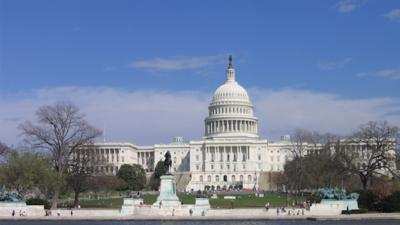Now Says The Legislation Would Increase The Federal Deficit Almost $100 Billion
The Congressional Budget Office has released a revised scoring of the 21st Century AIRR Act (H.R. 2997), and the news is not good for supporters of the bill and its plan to separate ATC from the FAA.

In the latest cost estimate released Tuesday, the CBO says that the AIRR Act would increase the deficit by nearly $100 billion. That's $80 billion more than their previous estimate.
According to the CBO document, most aviation-related excise taxes are scheduled under current law to expire on September 30, 2017. Consistent with the statutory rules that govern the construction of CBO's baseline for expiring excise taxes dedicated to trust funds, that baseline incorporates the assumption that aviation related excise taxes are extended permanently at the rate in effect at expiration. H.R. 2997 would extend the aviation taxes through September 30, 2023, and provide for temporary reductions in the tax rates from October 1, 2020, through September 30, 2023. The staff of the Joint Committee on Taxation (JCT) estimate that those rate reductions would result in a gross revenue reduction of $42.4 billion over fiscal years 2021 through 2024, and would have no effect on revenues thereafter.
The subsequent CBO baseline after H.R. 2997 is enacted would incorporate the assumption that the reduced excise tax rates in effect on September 30, 2023, would be extended permanently. That baseline treatment for expiring excise taxes dedicated to trust funds reflects the statutory rules that govern construction of CBO's baseline. As a result, the associated excise tax revenues in the subsequent baseline would be lower than those in the current baseline not only during the period of the temporary reduction in the rates, but also in those later years. Because budget rules require that estimates of revenue effects of proposed legislation measure the subsequent change to the baseline, JCT estimates an additional gross revenue loss $62.8 billion over the 2024-2027 period.
Excise taxes and business fees such as those that would be imposed by the AANS Corporation reduce the base of income and payroll taxes. As a result, changes in those types of business charges would lead to partially offsetting changes in revenues from income and payroll taxes. JCT and CBO estimate that the offsetting change in income and payroll tax revenues equals roughly 26 percent of the gross change in revenues. On that basis, the agencies estimate that enacting H.R. 2997 would on net, increase revenues from income and payroll taxes by $2.8 billion over the 2021-2027 period. That amount includes a $24.6 billion reduction in income and payroll taxes stemming from new fees charged by the AANS Corporation and a $27.4 billion increase attributable to changes in excise taxes.
According to the CBO, after taking into account lost tax revenue and new or increased taxes and fees, the net outcome is an increase in the deficit of $98.5 billion.
“$100 billion. Really? So here’s how it shapes up: The legislation would hand over the air traffic control system to the airlines, who are behind in equipping with the latest technology and responsible for 50 percent of delays; it would create a too-big-to-fail monopoly; and now it will cost taxpayers almost $100 billion dollars to create a new system when the one we have is the envy of the world,” said AOPA president and CEO Mark Baker.
“How can anyone think this is a good idea?" Baker said. "Imagine if we used that effort and money to continue modernizing an incredibly safe and efficient system. Then we’d really have something.”
(Source: AOPA and CBO document. Image from file)
 ANN's Daily Aero-Term (04.25.24): Airport Rotating Beacon
ANN's Daily Aero-Term (04.25.24): Airport Rotating Beacon ANN's Daily Aero-Linx (04.25.24)
ANN's Daily Aero-Linx (04.25.24) Klyde Morris (04.22.24)
Klyde Morris (04.22.24) Airborne 04.24.24: INTEGRAL E, Elixir USA, M700 RVSM
Airborne 04.24.24: INTEGRAL E, Elixir USA, M700 RVSM Airborne 04.22.24: Rotor X Worsens, Airport Fees 4 FNB?, USMC Drone Pilot
Airborne 04.22.24: Rotor X Worsens, Airport Fees 4 FNB?, USMC Drone Pilot



